中考英语--专题复习-- 简单句四种类型
初中英语“简单句”专题讲解

初中英语“简单句”专题讲解(一)基本概念只包含一个主语(或并列主语)和一个谓语(或并列谓语)的句子,称作简单句。
在简单句中主语和谓语是句子的主干,是句子的核心。
除了主语和谓语外,简单句中还可以有宾语、表语、补语、状语、定语等。
(二)句型结构简单句可归纳为五个基本句型。
1.主语+谓语这种句型简称为主谓结构,其谓语一般都是不及物动词,后面可以有其他成分修饰。
如:T h i n g s c h a n g e.H e s m i l e s h a p p i l y.2.主语+连系动词+表语这种句型称为主系表结构。
如:M r.S m i t h i s a n a r t i s t.T h e h a m b u r g e r t a s t e s g o o d.注:表语位于系动词之后。
常由名词、形容词、副词、介词短语、不定式、动词的-i n g、从句来充当。
常见系动词有:(1)表状态系动词---b e如:H e i s a t e a c h e r.H e i s i l l.(2)持续系动词--用来表示主语继续或保持一种状况或态度,常见有k e e p,r e m a i n,s t a y,如:H e a l w a y s k e p t s i l e n t。
(3)表像系动词--用来表示"看起来像"这一概念,主要有s e e m, a p p e a r,l o o k,如:H e l o o k s t i r e d.H e s e e m s(t o b e)v e r y s a d.(4)感官系动词---感官系动词主要有f e e l,s m e l l,s o u n d, t a s t e,如:T h i s k i n d o f c l o t h f e e l s v e r y s o f t.。
英语简单句五种基本句型和三种必考句型总结
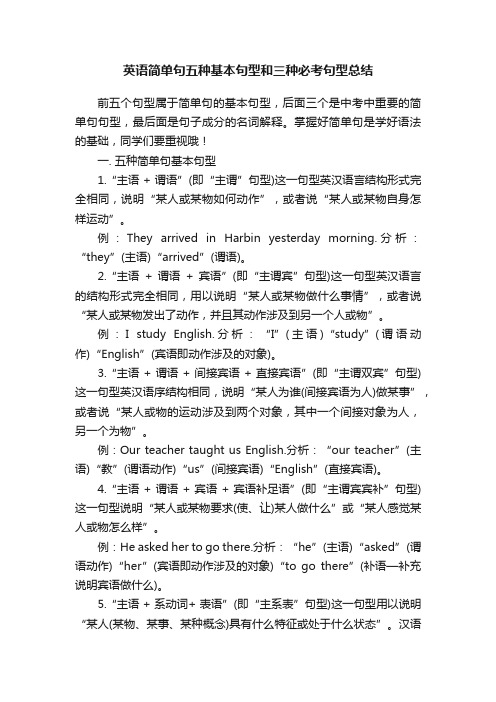
英语简单句五种基本句型和三种必考句型总结前五个句型属于简单句的基本句型,后面三个是中考中重要的简单句句型,最后面是句子成分的名词解释。
掌握好简单句是学好语法的基础,同学们要重视哦!一. 五种简单句基本句型1.“主语 + 谓语”(即“主谓”句型)这一句型英汉语言结构形式完全相同,说明“某人或某物如何动作”,或者说“某人或某物自身怎样运动”。
例:They arrived in Harbin yesterday morning.分析:“they”(主语)“arrived”(谓语)。
2.“主语+ 谓语+ 宾语”(即“主谓宾”句型)这一句型英汉语言的结构形式完全相同,用以说明“某人或某物做什么事情”,或者说“某人或某物发出了动作,并且其动作涉及到另一个人或物”。
例:I study English.分析:“I”(主语)“study”(谓语动作)“English”(宾语即动作涉及的对象)。
3.“主语 + 谓语 + 间接宾语 + 直接宾语”(即“主谓双宾”句型)这一句型英汉语序结构相同,说明“某人为谁(间接宾语为人)做某事”,或者说“某人或物的运动涉及到两个对象,其中一个间接对象为人,另一个为物”。
例:Our teacher taught us English.分析:“our teacher”(主语)“教”(谓语动作)“us”(间接宾语)“English”(直接宾语)。
4.“主语 + 谓语 + 宾语 + 宾语补足语”(即“主谓宾宾补”句型)这一句型说明“某人或某物要求(使、让)某人做什么”或“某人感觉某人或物怎么样”。
例:He asked her to go there.分析:“he”(主语)“asked”(谓语动作)“her”(宾语即动作涉及的对象)“to go there”(补语—补充说明宾语做什么)。
5.“主语 + 系动词+ 表语”(即“主系表”句型)这一句型用以说明“某人(某物、某事、某种概念)具有什么特征或处于什么状态”。
中考英语-语法-简单句(一)

(梧州中考)
—______ students are there in your class?
—Fifty.
A. How many
B. How much
C. How long
D. far
解析:考查选择疑问句。how many 意为“多少”,后面修 饰可数名词复数形式;how much意为“多少”,后面修饰 不可数名词;how long意为“多长;多久”,用于询问物体 或时间的长度;how far意为“多远”,用于询问距离。 students 是可数名词复数,故选how many。 答案: A
W___h_y__are you so excited about it? 你为什么对此那么激动?
反意疑问句
反意疑问句由“陈述句+简略疑问句”两部分组成,第一部 分提出一种看法,第二部分用来质疑或表示证实。陈述部 分与疑问部分的动词时态和动词性质应保持一致,而且肯 定和否定形式彼此相反,即陈述部分为肯定式时,疑问部 分用否定式;陈述部分为否定式时,疑问部分用肯定式。
We saw e_v_e_r_y__th__in__g i_n__g__o_o_d__o__rd__e_r.我们看到所有的东西都井井有条。 宾语 介词短语作宾补
Our teacher told u__s_t_o__c_o_m___e early tomorrow.我们老师叫我们明天早来。 宾语 不定式作宾补
倒装句
N__e__v_e_r shall I do this again. 我再也不会这样做了。 3. 用于no sooner than, hardly when和not until的句型中。
N__o__t_u_n__t_il__th__e__te__a_c_h_e_r__c_a_m__e_ did he finish his homework. 直到老师来了他才完成作业。
中考英语知识归纳复习专题 句子的种类 外研版-外研版初中九年级全册英语试题

句子的种类【句子的种类】简单句通常只由一个主语(或并列主语)和一个谓语(或并列谓语)构成,按句子功能一般分为陈述句、疑问句、祈使句、感叹句。
【简单句的基本句型】【考点训练1】1.My younger brother is smart and I have already taught ________ (he) some English.2.The orange tastes ______ (good/well).3.Loud music always makes me _____ (want) to dance.答案:him good want【陈述句】注意:否定句是在be动词、助动词或情态动词后加not,常用缩略形式,要注意人称、时态的一致。
【考点训练2】1.I woke up early in the morning.(改为否定句)I ____________ up early in the morning.2.Carrots are grown all over the world.(改为否定句)Carrots ______________all over the world.3.They have gone to Africa.(改为否定句)They __________________ to Africa.答案:didn’t wake aren’t grown haven’t gone【疑问句】◆常见疑问词(组)及其用法常用来询问交通方式;答语中出现by+v.ing时,一般用how来提问。
【考点训练3】1.—____ you ever ____ to Shanghai?—Yes,I went there last year. ()A.Are;goingB.Do;goC.Did;goD.Have;been2.—___ are you going to England?—To visit my uncle.He lives there with his family.()3.—Do you like listening to country music or rock music?—____.It brings me pleasure. ()A.Yes,I doB.No,I don’tC.I like musicD.Country music4.David never fights with his classmates,____? ()’t he’t he答案:DCDA祈使句祈使句表示请求、命令、劝告、叮嘱、号召、建议等。
中考英语简单句的种类讲义

简单句的种类句子种类的考查点有: There be 句型、感叹句、反义疑问句、倒装句、how词组及祈使句简单句复习即句子的种类1、陈述句(肯定式与否定式)2、疑问句:一般疑问句、特殊疑问句、选择疑问句和反义疑问句3、祈使句4、感叹句句子成分:主语、谓语、表语、宾语、定语和状语【考点一】简单句的五大基本句型1、主语+ 连系动词+ 表语--- The food tastes very delicious.2、主语+ 不及物动词--- The boy left happily.3、主语+ 及物动词+ 宾语--- Tom likes English a lot.4、主语+ 及物动词+ 间接宾语(指人) + 直接宾语(指物) --- They gave me some nice flowers.5、主语+ 及物动词+ 宾语+ 宾语补足语---I find Chinese very interesting.【考点二】陈述句1、定义用来陈述事实或观点的句子,句末用句号。
2、陈述句分为肯定陈述和否定陈述两种。
(1)、肯定陈述句的正常语序是主谓语序。
--- We will meet again soon.(2)、陈述句否定式的结构,含有be动词、情态动词或助动词的句子,是在这些词后加上not即可。
--- You mustn’t run across the street quickly.(3)、实意动词的否定形式要借助于助动词do, does或did, 并且将否定词not 加在助动词后。
--- I didn’t meet your mother last week.(4)、句中若有no, none, few, little, not, nobody, nothing, neither, nor, never, hardly, seldom 等否定意义的词时,可以构成陈述句的否定形式。
--- I had never seen such a good match before that day.【考点三】疑问句1、含义:用来提问的句子叫疑问句,句末用问号。
初高中英语简单句的种类
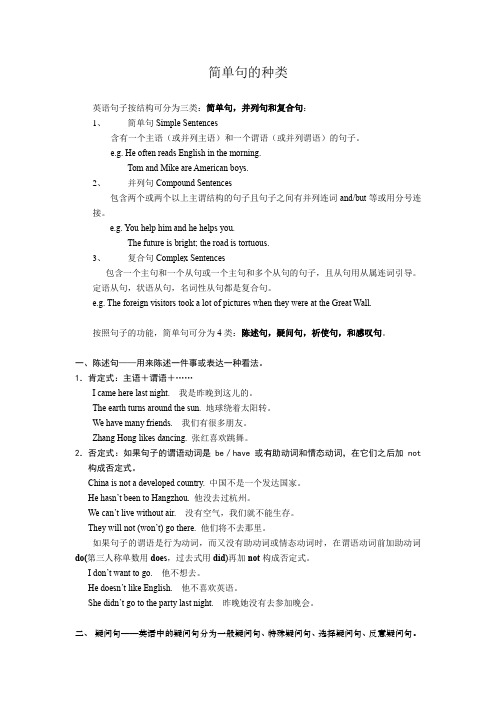
简单句的种类英语句子按结构可分为三类:简单句,并列句和复合句:1、简单句Simple Sentences含有一个主语(或并列主语)和一个谓语(或并列谓语)的句子。
e.g. He often reads English in the morning.Tom and Mike are American boys.2、并列句Compound Sentences包含两个或两个以上主谓结构的句子且句子之间有并列连词and/but等或用分号连接。
e.g. You help him and he helps you.The future is bright; the road is tortuous.3、复合句Complex Sentences包含一个主句和一个从句或一个主句和多个从句的句子,且从句用从属连词引导。
定语从句,状语从句,名词性从句都是复合句。
e.g. The foreign visitors took a lot of pictures when they were at the Great Wall.按照句子的功能,简单句可分为4类:陈述句,疑问句,祈使句,和感叹句。
一、陈述句——用来陈述一件事或表达一种看法。
1.肯定式:主语+谓语+……I came here last night. 我是昨晚到这儿的。
The earth turns around the sun. 地球绕着太阳转。
We have many friends. 我们有很多朋友。
Zhang Hong likes dancing. 张红喜欢跳舞。
2.否定式:如果句子的谓语动词是be/have或有助动词和情态动词,在它们之后加not 构成否定式。
China is not a developed country. 中国不是一个发达国家。
He hasn’t been to Hangzhou. 他没去过杭州。
We can’t live without air. 没有空气,我们就不能生存。
初中英语语法总结(简单句)

初中英语语法总结一、简单句1、简单句的特点:简单句通常只由一个主语(或并列主语)和一个谓语(或并列谓语)构成。
2、简单句的种类:简单句一般分为陈述句、疑问句、感叹句和祈使句四种。
3、陈述句:用来说明一个事实的句子叫陈述句。
它有肯定式和否定式两种形式。
▲陈述句的肯定式:He is a middle school student.(他是个中学生)/ I have a hammer in my hand.(我手上有把锤子)/ She teaches us geography.(她教我们地理)/ The new play was good enough and everybody enjoyed it.(新的话剧非常好大家都喜欢)▲陈述句的否定式:1)谓语动词如果是to be 、助动词、情态动词时,在它们的后面加“not”。
如:My brotheris not a teacher.(我的弟弟不是教师)/ He does not have a cousin.(他没有堂兄弟)/ I will not go there tomorrow.(明天我不去那儿)/ My mother is not cooking a meal inthe kitchen.(我母亲现在不在厨房里做饭)/ You must not make such mistakes again.(你不该再犯类似错误了)/ We haven’t discussed the question yet(我们还没有讨论那个问题呢).2)谓语动词如果没有上述词语而是其他动词时,须在它的前面加do not(don’t).如:Idon’t know anything about it.(此事我一无所知) / Li Ming does not feed pigs in thecountryside.(李明不在农村养猪)/ We didn’t expect to meet her right here.(我们没指望着在这里见到她)/ We didn’t have a meeting yesterday afternoon.(昨天下午我们没有开会)3)如果“have”作“有”讲,也可以在它后面加not构成否定式,其形式与have got的否定式相同。
初中英语中考语法:简单句和并列句的用法总结
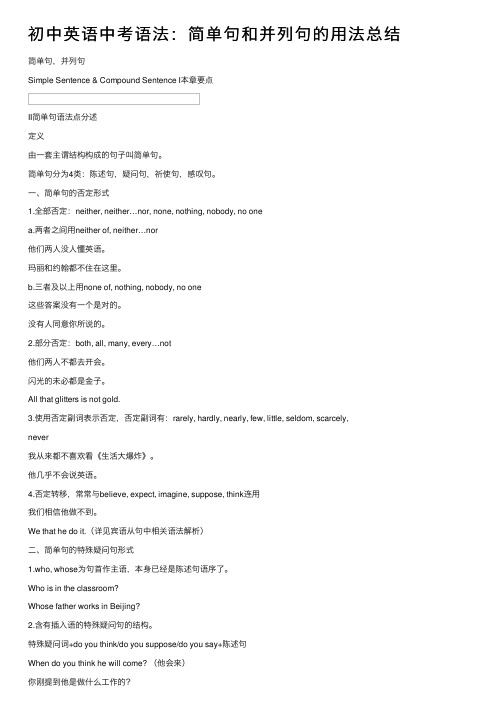
初中英语中考语法:简单句和并列句的⽤法总结简单句,并列句Simple Sentence & Compound Sentence I本章要点II简单句语法点分述定义由⼀套主谓结构构成的句⼦叫简单句。
简单句分为4类:陈述句,疑问句,祈使句,感叹句。
⼀、简单句的否定形式1.全部否定:neither, neither…nor, none, nothing, nobody, no onea.两者之间⽤neither of, neither…nor他们两⼈没⼈懂英语。
玛丽和约翰都不住在这⾥。
b.三者及以上⽤none of, nothing, nobody, no one这些答案没有⼀个是对的。
没有⼈同意你所说的。
2.部分否定:both, all, many, every…not他们两⼈不都去开会。
闪光的未必都是⾦⼦。
All that glitters is not gold.3.使⽤否定副词表⽰否定,否定副词有:rarely, hardly, nearly, few, little, seldom, scarcely,never我从来都不喜欢看《⽣活⼤爆炸》。
他⼏乎不会说英语。
4.否定转移,常常与believe, expect, imagine, suppose, think连⽤我们相信他做不到。
We that he do it.(详见宾语从句中相关语法解析)⼆、简单句的特殊疑问句形式1.who, whose为句⾸作主语,本⾝已经是陈述句语序了。
Who is in the classroom?Whose father works in Beijing?2.含有插⼊语的特殊疑问句的结构。
特殊疑问词+do you think/do you suppose/do you say+陈述句When do you think he will come? (他会来)你刚提到他是做什么⼯作的?三、简单句的否定疑问句形式回答永远是以事实为依据,肯定yes, 否定no她不是个医⽣吗?不,她是。
初中英语语法-简单句的5种基本类型全文

3. 主语+系动词+表语(S+系V+P) 这种句型称为主系表结构,系动词后 面必须跟表语,构成系表结构表示主 语的状态、性质、特征等情况。连系 动词在形式上也是一种谓语动词,但 实质上表语成了谓语。
系动词分类1-状态系动词
用来表示主语状态,只有be动词。be 动词 am/is/are am/is 过去式是 was, are 过去式 是 were 。你可以把 be 动 词翻译为是。(我用 am,你用 are, is 连着她他它,另外单数 is,复数 are)
05 主语+及物动词+宾语+宾语补足语(S+Vt+O+C)
动词分成及物动词和不及物动 词。及物动词和不及物动词的 区别在于所带的宾语不同。 动词是及物动词,后面直接接 宾语;动词是不及物动词,后 面不能跟宾语,也无被动语态。
01
主语+不及物动词(S+Vi)
1. 主语+不及物动词(S+Vi) 这种句型简称为主谓结构,其谓语一般都是不 及物动词 The boy laughed at last. 主语 谓语 这个男孩最后笑了。
我们必须保持教室整洁。
We must keep our classroom clean
主语 谓语
宾语
宾语补足语
他给我买了生日礼物。 They made her their leader. 主语 谓语 间宾 宾语补足语
The End
They will visit the Bird’s Nest this weekend.
主语 谓语
宾语
他们这个周末要去参观鸟巢。
中考英语语法集合——句子类型
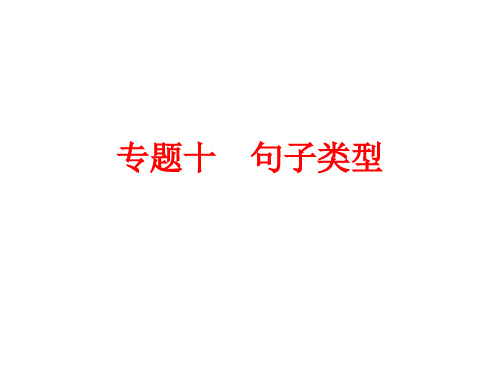
二、状语从句 状语从句在复合句中起状语的作用,修饰主句中 的谓语、形容词或副词。状语从句由从属连词引导, 从属连词不充当句子成分,只起连接作用。状语从句 可分为时间状语从句、条件状语从句、目的状语从 句、让步状语从句、原因状语从句、结果状语从句、 比较状语从句、地点状语从句等。
三、定语从句 在复合句中修饰某一名词或代词的从句称为定语 从句。定语从句通常位于所修饰的名词或代词之后, 常由关系代词或关系副词引出,被修饰的词称为先行 词。常见的关系代词有:who,whom,which, that,whose,关系副词有when,why,where。
for two C
hours.(现在分词)
他让我等了两个小时。
考点二
并列句
1.概念以及句型特点 (1)概念:并列句是由两个或两个以上的简单句连
接而成的。并列句中的各简单句意义同等重要,相互
之间不是从属关系,而是平行并列的关系。它们之间
用连词连接。
(2)句型特点:简单句+并列连词+简单句。
2.以常用连接词为线索剖析并列句 常用的连接词有以and, or, but, so为代表的四大 类。 (1)以and为代表的表示意义延伸的并列连词。 此类并列连词包括and(和;同), not only... but(also)... (不但……而且……), and then(那么)等。 He helps me and he also helps others. 他帮助我,也帮助别人。
He S
made Vt
us O
standChere.(动词不定式)
他让我们站在这儿。
She let the boy S Vt O
iCn.(副词)
她让这个男孩进去。
The present makes
中考英语简单句并列句复合句考点讲解及练习

简单句、并列句和复合句考点一简单句1.简单句只包含一个主谓结构.2.五种简单句:1)主+谓. He comes at last.2)主+系+表. She is a teacher.The soup tastes nice.3)主+谓+宾. They reached the village.4)主+谓+间宾+直宾. He gave me a pen.5)主+谓+宾+宾补. I find that book very useful.考点二并列句并列句:两个或两个以上的简单句,用连词连接起来;常用的连接词有:1.表示顺承关系的:and, not only…but also不仅….而且….等;She ______ gave us a lot of advice, _______ helped us to overcome difficulties.Linda tried to become an excellent teacher, _____ at last she succeeded.2.表示选择关系和否定条件的有or还是,否则Do you want to leave now ____ would you rather set off laterWear your coat, ____ you’ll catch a cold.3.表示转折关系的有but, yet等;He is young, but he works hard.虽然他年轻,但工作努力;4.表示因果关系的有for, so 等;My leg hurts so I go to see a doctor. 我的腿疼,因此我去看医生;考点三主从复合句:宾语从句1.宾语从句的引导词1引导陈述句用 that在口语和非正式文体中常常省略He tells me that he is going shopping this Sunday.2 引导一般疑问句用if或whether.She asked me if\ whether she could join us. whether…or not3 引导特殊疑问句,要用原来的特殊疑问词;She asked them what they were doing.2.宾语从句的语序:要用陈述句语序;I want to know when the train left.3. 宾语从句的时态1主句是一般现在时,一般将来时或祈使句,宾语从句可根据实际需要选用各种时态;He tells us that he has been able to look after himself.(2)主句是过去时态,宾语从句应使用过去时的相应时态;They said that they had already finished the work.(3)如果宾语从句叙述的是客观事实、真理、自然现象等,不管主句用什么时态,从句都用一般现在时;He said that light travels faster than sound.3. 练习1She asked me, “Will you go to the cinema tomorrow”改为含宾语从句的复合句She asked me______ I ______ go to the cinema the next day.2 How lovely the dog is Can you tell me _____A. where did you get itB. where will you get itC. where you got it3 --- Can you tell me _____ your parents at home--- I often wash clothes and sweep the floor.A.how will you helpB. how you helpC. how will you helpD. howdo you help4 When I was young, my grandfather told me that the sun ______ rise in the east.考点四状语从句一、状语从句在复合句中作状语,修饰主句中的动词、形容词、副词等;1.地点状语从句地点状语从句通常由 where 引导;Put all the things _____they were.A. whereB. whenC. whoseD. which2.时间状语从句主句用将来时,从句用一般现在时时间状语从句的引导词有when, before, after, until, as soon as, since, while, as 等She was cooking when someone knock at the door.What will you do after you finished your homework3.条件状语从句在条件状语从句中,常用的引导词有if, unless等;If it dosen’t rain, I” ll go fishing.They will have a picnic unless it rains next Sunday.4.原因状语从句原因状语从句常用的引导词有because, as, since既然等He didn’t come because he was ill.Since we are students, we should study hard.Because 和so 不能在一个句子中同时使用;5. 结果状语从句结果状语从句主要由so…that…, such…that…引导;It’s so hot that we want to go swimming.That’s such an interesting story that everybody likes it.So… that…与简单句之间的句型转换1)that后的句子是否定句,常用too…to进行转换;He is so young that he can’t go to school. he is too young to go to school.2)that后的句子是肯定句;常用enough to 进行转换;The shirt was so cheap that he bought it. the shirt was cheap enough for him to buy.6.目的状语从句目的状语从句常用的引导词有so that, in order that 等 in order to 简单句Please say it in a loud voice so that everyone can hear it.He works harder in order that he can go to a good college.7. 让步状语从句引导词有though, although, even if, even though尽管等;He often helps others though\ although he is not rich.They will stand by you even if you don’t succeed.Though, although与but 不能同时出现在一个句子中8.比较状语从句比较状语从句由than, as…as…, not as\so… as等引导;比较级He is more outgoing than I.He ran as fast as Mike.二、练习1. It’s quite common in Britain to say “thank you”to the drivers _____ people get off the bus.a. afterb. sincec. untild. when2. The art club is for members only. You can’t go in ____you are a member.a. unlessb. becausec. ifd. though3. Now many parents send their children to foreign countries, _____ they want them to get a better education.a. untilb. thoughc. because4. ---- What would some students like to do after finishing their education---- They would like to start to work_______ they needn’t depend on their parents completely.a. as soon asb. so thatc. befored. while考点五定语从句修饰某一名词或代词的从句叫定语从句;被定语从句修饰的词叫先行词,引导定语从句的词叫关系词关系代词和关系副词;1.关系代词的基本用法The man __________spoke at the meeting is from Hong Kong. 指人作主语The building ___________is being built will be used as a hospital.指物作主语I visited a scientist _______ name is known all over the world. 指人作定语2. 关系代词特殊用法1当关系代词在从句中作主语时,从句的谓语动词要与先行词保持一致;He is one of the boys who ______ like playing football.He is the only one of the boys who________ like playing football.2 通常以下四种情况关系代词只能用that而不能用which.1 先行词为all, much, something, everything, nothing, little, none, the one 等不定代词时2先行词被形容词最高级修饰时;3当先行词被the only, the very, the just等修饰时;4先行词中既有人又有物时;3. 关系副词的基本用法;1 when 在句中作状语,表示时间;2 where 在句中作状语,表示地点;.3 why 在句中作状语,表示原因;He remembers the day _______ he joined the League.This is the reason_______ he is late today.This is the place _______ Lu Xun was born.1. 2011泰安--- _______do you read English newspapers---I read China Daily every day.A. How longB. How soonC. How oftenD. How far2.2011抚州John had a short walk after lunch, _______A. did heB. didn't heC. had heD. hadn't he3.2011宁波--- _______do you have an Art Festival in your school---Once a year.A. How longB. How oftenC. How farD. How soon4.2011安徽省If you want to go to see the movie this evening, so _______I.A. doB. amC. willD. should5.2011长沙 _______tall the girl isA. HowB. HowaC. WhatD. What a6.2011长沙 _______ call me Mimi It's my cat's name.A. NotB. Didn'tC. Doesn'tD. Don't7.2011长沙They went to the park yesterday,_______A. don't theyB. didn't theyC. aren't theyD. can't they8.2011福州---Li Mei usually helps others, _______---Yes, she is kind-hearted.A. does sheB. is sheC. doesn't she9.2011眉山There _______an English party in our school tomorrow evening.A. haveB. will haveC. is going to haveD. will be10. 2011济南--- _______a year does your school have sports meetings---Twice a year.A. How oftenB. How soonC. How longD. How many times11. 2011泰州---I have changed my job.---_______.A. So do IB. So have IC. So I doD. So I have12. 2011济南Mike learns a lot about Internet. And _______.A. I don't, eitherB. so do IC. so am I am, too13. 2011眉山Jim never goes to the movies on Saturday, _______A. does JimB. doesn't JimC. doesn't heD. does he14. 2011玉州You've just finished your listening exam Please getyourself ready for the next part, _______A. shall weB. will youC. do youD. are you15. 2011眉山--- _______the weather like last Monday---It was sunny.A. How wasB. What'sC. What wasD. How is16. 2011潍坊_______great scientist Qian Xuesen isA. HowB. HowaC. WhatD. What a17. 2011眉山--- _______do you visit your grandparents---Once a month.A. How soonB. How longC. How muchD. How often18. 2011内江--- _______ do you speak English so well---Because I practice it with my partner every day.A. WhyB. WhenC. Who19. 2011泉州---We'll go to Qing Yuan Mountain tomorrow. Why _______join us---That's a good idea.A. notB. don'tC. can'tD. didn't20. 2011泉州There is little milk in the glass, _______A. is thereB. isn't thereC. isn't itD. does it21. 2011肇庆The students in Class Two played basketball against ClassOne yesterday,_____A. did theyB. didn't theyC. weren't they22. 2011宁波---What a new computer Can you tell me_______---Just the day before yesterday.A. how much you paid for itB. how much did you pay for itC. when you bought itD. when did you buy it23. 2011泰安---Tom wants to know if you will have a picnic tomorrow.---Yes. But if it _______, we'll play chess instead.A. will rainB. rainedC. is rainingD. rains24. 2011烟台---Do you know this dictionary belongs to---Let me see. Oh, it's_______.A. who does; mineB. who; meC. whose; mineD. who; mine25. 2011杭州Franklin told them all _______to be in Britain again.A. he was how happyB. how happy he wasC. how was he happyD. he was happy how26. 2011湖州---What kind of movies do you like---I like the movies_______ are about Chinese history.A. whoB. whomC. whoseD. that27. 2011丽水---Do you know _______---Sorry, I don't have a watch.A. whose watch this isB. whose watch is thisC. what time it isD. what time is it28. 2011重庆The woman asked the policeman where _______.A. the post office isB. the post office wasC. is the post officeD. was the post office29. 2011泰安---Can you guess_______ the new schoolbag yesterday.----Sorry, I've no idea.A. how much did he pay forB. how much he spentC how much he paid for D. how much did he spend30. 2011杭州Who is the man_______ is reading a book over thereA. thatB. whichC. whoseD. what31. 2011湖州---Do you know_______---Next Sunday.A. what they will doB. where they will doC. when they will come hereD. who they will meet32. 2011长沙---Can you tell me why_______---Because I want to help the people there.A. do you go to Tibet西藏B. did you go to TibetC are you going to Tibet D. you are going to Tibet33. 2011浙江省---Linda, could you tell me _______---He is an actor.A. what he doesB. what does he doC where he works D. where does he work34. 2011福州---Could you tell me _______---Sure. The day after tomorrow.A. when will you leave for the U.S.A.B. when Mr. Lee will comeC when your father returned35. 2011济南He asked me_______.A. who did kick the first goal in the World CupB. when was the A. PEC meeting heldC when China became a member of the WTOD. where will the 2008 Olympics be held36. 2011玉州Jane is one of the students in the class _______ have everbeen to China.A. whoB. whoseC. whichD. whom37. 2011济宁Can you tell me _______after this examA. what you didB. what did you doC. what will you doD. what you will do38. 2011苏州---Can you tell me how many colours _______ in a rainbow---SevenA. there areB. are thereC. they areD. are they39. 2011潍坊I can't understand _______Apple's iPad 2.A. why are they so mad aboutB. why they are so mad aboutC. how are they so mad aboutD. how they are so mad a。
中考英语总复习 简单句(陈述句、感叹句、疑问句及祈使句)
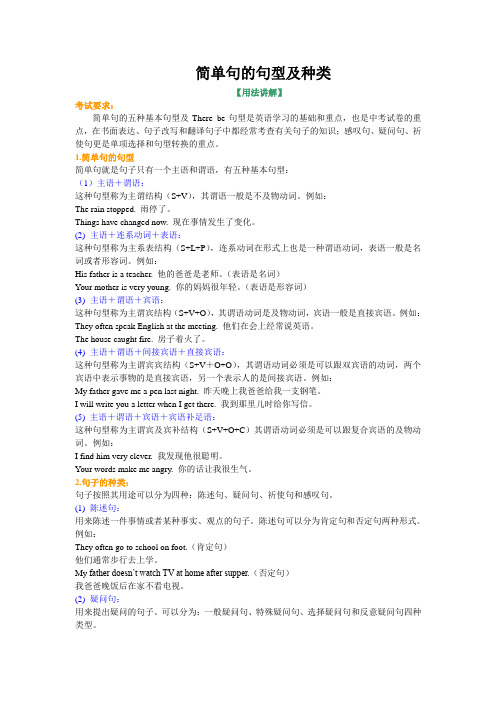
简单句的句型及种类【用法讲解】考试要求:简单句的五种基本句型及There be句型是英语学习的基础和重点,也是中考试卷的重点,在书面表达、句子改写和翻译句子中都经常考查有关句子的知识;感叹句、疑问句、祈使句更是单项选择和句型转换的重点。
1.简单句的句型简单句就是句子只有一个主语和谓语,有五种基本句型:(1)主语+谓语:这种句型称为主谓结构(S+V),其谓语一般是不及物动词。
例如:The rain stopped. 雨停了。
Things have changed now. 现在事情发生了变化。
(2)主语+连系动词+表语:这种句型称为主系表结构(S+L+P),连系动词在形式上也是一种谓语动词,表语一般是名词或者形容词。
例如:His father is a teacher. 他的爸爸是老师。
(表语是名词)Your mother is very young. 你的妈妈很年轻。
(表语是形容词)(3)主语+谓语+宾语:这种句型称为主谓宾结构(S+V+O),其谓语动词是及物动词,宾语一般是直接宾语。
例如:They often speak English at the meeting. 他们在会上经常说英语。
The house caught fire. 房子着火了。
(4)主语+谓语+间接宾语+直接宾语:这种句型称为主谓宾宾结构(S+V+O+O),其谓语动词必须是可以跟双宾语的动词,两个宾语中表示事物的是直接宾语,另一个表示人的是间接宾语。
例如:My father gave me a pen last night. 昨天晚上我爸爸给我一支钢笔。
I will write you a letter when I get there. 我到那里儿时给你写信。
(5) 主语+谓语+宾语+宾语补足语:这种句型称为主谓宾及宾补结构(S+V+O+C)其谓语动词必须是可以跟复合宾语的及物动词。
例如:I find him very clever. 我发现他很聪明。
中考英语语法语法专项之简单句

五、There be 句型(存现句)和主谓一致
3. There be 句型与have的区别
There be 句型表示“存在”,强调“某地或某时有某物或某人”,不表示所属关系。 have 表示所属关系,强调“某人或某物拥有...”。 There is a pen on my desk. 我的书桌上有一支钢笔。(钢笔在我书桌上,但不一定是我的) I have a pen. 我有一支钢笔。(钢笔不管在哪儿,它都是我的)
六、主谓一致
3. 就近一致
就近一致即谓语动词与离它最近的主语部分保持一致。 There be/Here be 句型 either...or..., neither...nor..., or not only... but also..., not... but...
一、简单句的基本句型
2. 简单句的五种基本句型:
主语+系动词+表语 (S+V+P) 主语+不及物动词 (S+V) 主语+及物动词+宾语 (S+V+O) 主语+及物动词+间接宾语+直接宾语 (S+V+IO+DO) 主语+及物动词+宾语+宾语补足语 (S+V+O+OC)
She is beautiful. Mike works hard. I teach English. Maria sent me a present.
二、疑问句
1. 疑问句的分类
句型 一般疑问句
特殊疑问句 选择疑问句 反意疑问句
结构 Be+主语+其他? 情态动词+主语+动词原形+其他? 助动词+主语+动词原形+其他? 助动词+主语+过去分词+其他? 特殊疑问句+一般疑问句? 一般疑问句,...+or+另一备选对象? 特殊疑问句,...+or+另一备选对象? 陈述句/祈使句+附加问句
中考英语--专题复习-- 简单句四种类型 (2)

中考英语--专题复习-- 简单句四种类型简单句的四种类型一.按要求回答问题。
1.There is only one problem.否定句:__________________________________________一般疑问句:________________________________________肯定/否定回答:____________________________________2.She has some bread for lunch today.否定句:__________________________________________一般疑问句:_________________________________肯定/否定回答:____________________________________ .3.He has three different colored pencil-boxes.否定句:__________________________________________4. Sue did her homework last night.否定句:__________________________________________5. There're some new machines in the house.一般疑问句:_________________________________二.单项选择。
1. She is a good student, _____ she?A. isB. isn’tC. doesD. doesn’t2. -_____ do you go to the park?-Once a year.A. How oftenB. How longC. How soonD. How many times3. -_____ books do you have?-Oh! I can’t remember the number, but a lot of them.A. WhatB. WhichC. How manyD. How much4. Let’s have a rest, _____?A. won’t youB. will youC. don’t youD. shall you5. -_____ did you move to Paris?-Because my father found work there.A. WhyB. WhenC. WhereD. How【相似题练习】一.按要求回答问题。
- 1、下载文档前请自行甄别文档内容的完整性,平台不提供额外的编辑、内容补充、找答案等附加服务。
- 2、"仅部分预览"的文档,不可在线预览部分如存在完整性等问题,可反馈申请退款(可完整预览的文档不适用该条件!)。
- 3、如文档侵犯您的权益,请联系客服反馈,我们会尽快为您处理(人工客服工作时间:9:00-18:30)。
中考英语--专题复习-- 简单句四种类型简单句的四种类型一.按要求回答问题。
1.There is only one problem.否定句:__________________________________________一般疑问句:________________________________________肯定/否定回答:____________________________________2.She has some bread for lunch today.否定句:__________________________________________一般疑问句:_________________________________肯定/否定回答:____________________________________ .3.He has three different colored pencil-boxes.否定句:__________________________________________4. Sue did her homework last night.否定句:__________________________________________5. There're some new machines in the house.一般疑问句:_________________________________二.单项选择。
1. She is a good student, _____ she?A. isB. isn’tC. doesD. doesn’t2. -_____ do you go to the park?-Once a year.A. How oftenB. How longC. How soonD. How many times3. -_____ books do you have?-Oh! I can’t remember the number, but a lot of them.A. WhatB. WhichC. How manyD. How much4. Let’s have a rest, _____?A. won’t youB. will youC. don’t youD. shall you5. -_____ did you move to Paris?-Because my father found work there.A. WhyB. WhenC. WhereD. How【相似题练习】一.按要求回答问题。
1.This is a bike under the tree. (否定句,一般疑问句,并作肯定和否定回答。
) 2.She has some story-books. (否定句,一般疑问句,并作肯定和否定回答。
)3. It is quite a nice present. (改为感叹句)4. The fish is very lovely. (改为感叹句)5. Let us go to the cinema together, _____ _____? )(完成反意疑问句)二.选出正确选项。
1. He hardly hurt himself in the accident, _____?A. doesn’t heB. didn’t heC. did heD. does he2. The poor man needs our help, _____ he?A. needB. needn’tC. doesD. doesn’t3. Alice has to finish her work now, _____ she?A. hasB. hasn’tC. doesD. doesn’t4. A sign with the words“____” is often found in a bus.A. Not parkingB. Not smokingC. No parkingD. No smoking5. The robot can help me sweep the floor. _____ smart invention it is!A. WhatB. What aC. What anD. How【知识链接】(1)陈述句(2)疑问句(3)感叹句(4)祈使句【知识梳理】1.简单句的特点:简单句通常只由一个主语(或并列主语)和一个谓语(或并列谓语)构成。
2.简单句根据使用目的一般可分为四类:陈述句、疑问句、感叹句和祈使句四种。
一.陈述句:用来说明一个事实的句子叫陈述句。
它有肯定式和否定式两种形式。
1.陈述句的肯定式:主语+谓语(+其他)eg: He is a middle school student.(他是个中学生)She teaches us geography.(她教我们地理)2.陈述句的否定式:(1) 谓语动词如果是be动词、情态动词时,在它们的后面加“not”。
结构为:主语+be/情态动词+not+其他eg:My brother is not a teacher.(我的弟弟不是教师)He can not swim.(他不会游泳)(2) 谓语动词如果没有上述词语而是其他动词时,须在它的前面加do not(don’t)/ does not (doesn’t)/ did not (didn’t)。
结构为:主语+ do not(don’t)/ does not (doesn’t)/ did not (didn’t)+动词原形+其他eg: I don’t know anything about it.(此事我一无所知)We didn’t have a meeting yesterday afternoon.(昨天下午我们没有开会)(3) 如果“have”作“有”讲,也可以在它后面加not构成否定式,其形式与have got的否定式相同。
eg:I haven’t (got) any brothers or sisters.(我没有兄弟姐妹)(4)[注意]①句子中如果有all、both、very much/well等词时,用not一般构成部分否定,如果要完全否定,则通常使用none、neither、not…at all等;All of them went there.→None of them went there.(他们全都去了那里→他们全都没去那里)②句子中含有little、few、too(太)、hardly、never、neither、nor、seldom等词时, 则视为否定句。
eg:Few people live there because life there is very hard.(几乎没有人生活在那里因为那里的生活太艰难了)③陈述句(主语+谓语+其他)在口语中可以直接表示疑问,表示惊讶或明知故问。
eg:That’s your boss?(那就是你的老板?!)④陈述句一般情况下应使用正常的语序,即:主语+谓语+其他。
但是有时会倒装,详见“倒装句”。
⑤所有的从句一律使用陈述句语序,即在连接词后采用“主语+谓语+其他”的顺序。
eg:The old man told me that he would live here for ten more years before he returns home. (老人告诉我说他还要在这儿住几年然后回家)Could you tell me who you saw at the party last night?(能告诉我在聚会上你都看见了谁吗?)二.疑问句:1.一般疑问句:用“yes”或“no”来回答的疑问句叫做一般疑问句。
(1)一般疑问句构成:①句中谓语动词是be动词、情态动词时,则将它们(提前)放到主语前面。
其结构为:Be/情态动词+主语+其他;eg:Is he an engineer?(他是工程师吗?)Can you explain it ?(你能解释它吗?)②谓语动词如果没有上述词语而是其他动词时,则在主语前面加助动词do/ does/ did, 原来的谓语动词改为原形。
其结构为:Do/ Does/ Did+主语+动词原形+其他eg:Do you get up at six every morning?(你天天早晨六点起床吗?)(2)一般疑问句的回答:一般疑问句通常用简略形式来回答, 回答时所用的时态应和问句里的时态一致。
eg:①—Will you join us in playing basketball?(你们加入我们打篮球好吗?)—Yes, we will.(是的我们会。
)/ —No, we won’t.(不我们不会。
)②—Have you got today’s newspaper?(你有今天的报纸吗?)—Yes, I have .(是的有。
)/ —No, I haven’t.(不没有。
)(3)一般疑问句的否定结构(即否定形式的一般疑问句)表示惊奇、责怪、建议、看法等,只要将“not”置于主语之后或者将“not”放到主语之前与be, have等助动词或情态动词合并在一起就可以了。
eg:Isn’t your sister a Party member?(你的姐姐不是党员吗?)这种否定结构的疑问句的回答与汉语的习惯不同。
如果回答是肯定的,就用“yes+肯定结构”;如果回答是否定的,就用“no+否定结构”。
(情况与反意问句类似。
)如:—C an’t he answer the question? (他不能回答这个问题吗?)—Yes,he can.(不,他能回答这个问题。
) —No,he can’t. (是的,他不能回答这个问题。
)2.特殊疑问句:要求具体回答的问句。
(1) 特殊疑问句结构是:eg:What do you want?Whose magazine is this?(这是谁的杂志?)When did you get up this morning?(你今早什么时候起身的?)但是,“who”引出的询问主语或主语部分相关词的特殊疑问句的结构与陈述句词序相同: eg:Who is dancing over there?(谁在那边跳舞?)有时“what”,“which”,“whose”也可以引出与陈述句词序相同的特殊疑问句。
如:What is on the wall?(什么东西在墙上?/墙上有什么?)/ Which is yours?(哪个是你的?)/ Whose book is in your bag?(谁的书在你的书包里?)[注意]从陈述句改为特殊问句时,先将句子改为一般问句,再将(划线)提问部分更改为疑问词置于句首,特别要注意助动词的使用!如果只对主语或主语的修饰词提问,那么只需要将疑问部分改为疑问词即可。
